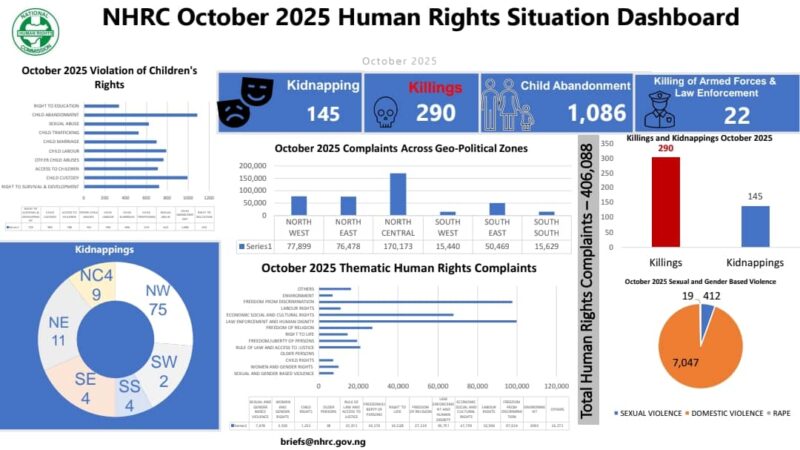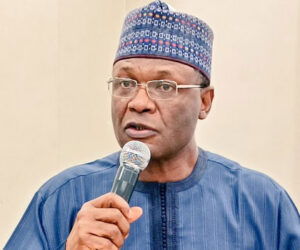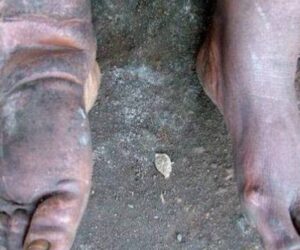The National Human Rights Commission (NHRC) has called on the international community, especially the United States, to work with Nigeria in addressing religiously motivated killings and terrorism rather than issuing threats or sanctions.
The Executive Secretary of the Commission, Tony Ojukwu, said this on Monday while presenting the NHRC’s October 2025 Human Rights Dashboard, which recorded 406,088 complaints and over 160 monitored incidents of human rights violations across the country.
Mr Ojukwu acknowledged that conflicts and insurgency in parts of Nigeria have resulted in the killing of Christian civilians by religious extremists. He, however, stressed that citizens from other faiths have also been victims.
“No life should be lost to conflict or criminality,” he said. “The government’s responsibility to protect lives and property under section 14(2) of the Constitution must remain paramount.”
October Dashboard
Mr Ojukwu explained that Boko Haram and ISWAP’s ideology of Islamising Nigeria has caused the killing of both Christians and Muslims who reject their doctrine.
“The common enemy here is Boko Haram, which targets Christians and Muslims alike,” he said. “Rather than threats, the international community should support Nigeria’s efforts to end terrorism and religious extremism. Only through partnership and mutual respect can we secure the lives and liberties of all Nigerians.”
He added that the United States’ call should be understood as an injunction for urgent action to stop the killings, and should be seen as an opportunity to reform Nigeria’s approach to terrorism and conflict, with emphasis on civilian protection and accountability for perpetrators.
He expressed confidence that the Nigerian government has the capacity to take the necessary steps.
PREMIUM TIMES reports that US President Donald Trump recently declared Nigeria a “country of particular concern.”
This was the result of a campaign by some US lawmakers, including congressman Riley Moore, who alleged that there was an “alarming and ongoing persecution of Christians” in Nigeria. The congressman claimed that 7,000 Nigerian Christians had been killed in 2025 alone, an average of 35 a day.
Mr Trump also threatened to take direct military action against Islamist militant groups operating in Nigeria.
However, the Nigerian government, through the Minister of Information and National Orientation, Mohammed Idris, refuted this claim, describing it as false, baseless, despicable, and divisive.
Nigeria was first designated a Country of Particular Concern during the first term of President Trump. But the designation was lifted during the Joe Biden presidency.
Other complaints
The NHRC also presented its latest monthly chart of human rights violations.
It recorded 7,478 cases of sexual and gender-based violence in October.

It also documented 9,920 cases related to women and gender rights, 7,233 cases of child rights violations, 38 cases affecting older persons, and 20,973 cases on rule of law and access to justice.
It also recorded 19,370 cases on freedom/liberty of persons, 14,528 cases on the right to life, 27,119 cases on freedom of religion, and 99,797 cases related to law enforcement and human dignity.
It also recorded 67,799 cases on economic, social and cultural rights, 10,996 cases on labour rights, 97,614 cases on freedom from discrimination, 6,950 cases on environment, and 16,273 other complaints.
The commission also documented 1,086 cases of child abandonment, 992 cases of child custody disputes, 789 cases of child labour, 762 cases of other child abuses, and 720 rights to surveillance and development.

It also documented 708 cases of access to children, 696 cases of child marriage, 523 cases of child trafficking, and 335 cases of right to education.
On geopolitical breakdown, the North-central recorded the highest number of incidents with 170,173 complaints, which the commission linked to terrorism, kidnappings, and banditry.

The North-west had 77,899 complaints, while the North-east recorded 76,478 complaints, largely driven by terror attacks, abductions, and sexual violence.
The South-east recorded 50,469 complaints, the South-south had 15,629 complaints, and the South-west had 15,440 complaints.










